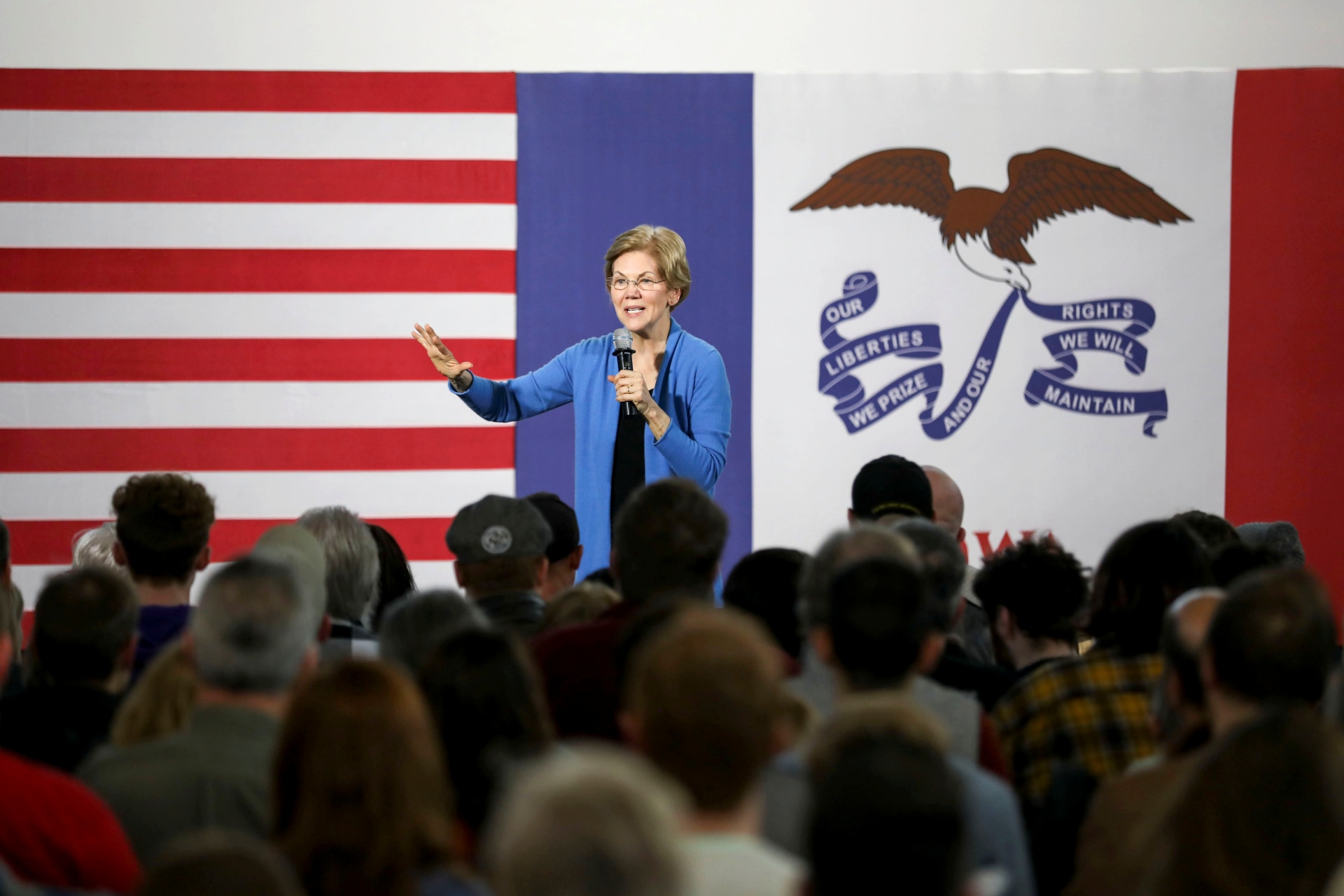Campaign Foreign Policy Roundup: Elizabeth Warren Endorses the USMCA
Each Friday, I look at what the presidential challengers are saying about foreign policy. This week: Elizabeth Warren says she will vote for NAFTA’s replacement, the candidates tout Congress’s war powers, and a shrinking field of Democrats prepares for the next debate.

By experts and staff
- Published
Experts
![]() By James M. LindsayMary and David Boies Distinguished Senior Fellow in U.S. Foreign Policy
By James M. LindsayMary and David Boies Distinguished Senior Fellow in U.S. Foreign Policy
Each Friday, I look at what the presidential challengers are saying about foreign policy. This week: Elizabeth Warren says she will vote for NAFTA’s replacement, the candidates tout Congress’s war powers, and a shrinking field of Democrats prepares for the next debate.
Lost in the fallout over the killing of Qasem Soleimani is news on the trade front, namely, that Elizabeth Warren plans to vote for the U.S.-Mexico-Canada Agreement (USMCA) when it comes to the floor of the Senate. That should happen by the end of the month. The news was surprising because the Massachusetts senator has been a critic of the trade deal. Indeed, when negotiators were ironing out the agreement’s final details in November 2018, she said she opposed it because “it won’t stop outsourcing, it won’t raise wages, and it won’t create jobs.”
So why the change? Warren told the CBS affiliate in Boston that:
Workers have had the legs taken out from underneath them and this agreement makes improvements. It’s going to help open up some markets for farmers, they need that stability. It’s going to help with enforceable labor standards and that’s going to be useful. We really need trade negotiations going forward that make sure anyone who wants access to our markets is actually helping us in the fight against climate change and helping build an economy that works for everybody in the US … It’s not as much improvement as I’d like to see but right now they’re in a terrible hole where Donald Trump has put them.
She went further this past Sunday on Meet the Press, crediting several of her colleagues for working to get the Trump administration to address Democratic concerns on the USMCA’s labor and environmental provisions. Warren said she was trying “to be practical,” but “as president, I want to see us negotiate a very different kind of trade deal.”
Warren’s change of heart won’t affect the USMCA’s fate. The House of Representatives endorsed the deal last month, and the Republican-controlled Senate is all but certain to bless it as well. But her decision does constitute a significant break with Bernie Sanders, with whom she is competing for the votes of more liberal Democrats. The Vermont senator has said he will vote no on the USMCA. In choosing, even if reluctantly, to endorse the USMCA, Warren took a step familiar to everyone who has ever sat in the Oval Office—deciding that getting less than their ideal outcome is better than getting nothing at all.
The Candidates in Their Own Words
The Soleimani killing dominated the foreign policy talk on the campaign trail this week, with almost all of the candidates denouncing President Trump’s decision as reckless. The one exception was Bill Weld. He told the Des Moines Register’s editorial board he thought Trump had done the right thing, though he still took a shot at the president: “As for what was actually, eventually done, I think that’s defensible. I think it’s defensible even under international law … One thing I could tell you is that I wouldn’t have done it just because I thought I was the smartest guy in the room, without talking to anyone else.“
The Soleimani killing also prompted a surge of calls for restoring Congress’s war powers. Sanders partnered with Representative Ro Khanna to introduce the “No War With Iran Act of 2020.” It would block any funds from being used for offensive military activities in or against Iran without congressional approval. Warren is a cosponsor in the Senate. Sanders said the legislation was necessary because:
Our Founding Fathers understood that it was only too easy for a president to lead the country into a disastrous military conflict. That is why they gave the exclusive power over war and peace to the people’s elected representatives. We cannot remain bystanders right now. It is imperative that the United States Congress provide the kind of leadership that our country needs by passing this legislation and defending the Constitution and the rule of law. President Trump does not have the right to go to war with Iran without authorization from the representatives of the American people.
Along much the same line, Amy Klobuchar praised yesterday’s House vote to invoke the War Powers Resolution:
The House vote to require the President to come to Congress to get any authorization for military action against Iran is an important step towards Congress upholding its Constitutional duties. We must use this moment to de-escalate instead of ramping up the rhetoric towards war.
Michael Bennet did likewise, calling for the Senate to follow the House’s lead:
The House just sent a critical message to President Trump: Congress will not stand idly by as he makes one reckless foreign policy decision after another.
The Senate should do the same. https://t.co/0UXZ56OIue
Andrew Yang said he would not have ordered the strike and that, as president, he “would push the power to declare war back to Congress where it belongs in our Constitution.”
You’re required to abide by the war powers resolution, Mr. President, and you cannot pursue with Iran without consent and authority from Congress. The existing AUMFs, the congressional authorization for use of military force, do not apply.
It remains an open question whether the candidates will be as scrupulous about Congress’s war powers should they make it to the Oval Office. Candidate (and constitutional law professor) Barack Obama held a narrow view of presidential war powers. President Barack Obama had an expansive one.
What the Pundits Are Saying
The New York Times editorial board wants voters to pay more attention to what the challengers have to say about foreign policy because of “Mr. Trump’s frightening style of leadership.”
The Times’ Sydney Ember and Katie Glueck explored the differences in how Biden and Sanders view foreign policy, arguing that no two candidates better illustrate the sharp divisions in the Democratic Party about what American leadership abroad should look like. Meanwhile, the Times’ Reid Epstein wrote that “with foreign policy emerging as a top priority as tensions with Iran surge, Mr. Buttigieg is leaning even harder on his veteran status as he seeks to become the nation’s commander in chief, threading it through answers with more frequency than he did earlier in the campaign.”
CNN’s analysts and reporters were similarly active. Ronald Brownstein argued that how voters will ultimately perceive President Trump’s decision to kill Soleimani hinges on two simple descriptions of the move: “impulsive” or “decisive.” On that point, Brownstein quoted a smart observation by Richard Fontaine, the president of the Center for a New American Security: “The difference between decisive and impulsive turns in part on what happens after you make the decision.” Chris Cillizza traced Warren’s increasingly tough condemnations of the Soleimani killing and concluded she was reacting to the fact that “the liberal left didn’t like her initial statement and she needs those voters to have a chance at winning the Democratic presidential nomination this year.” MJ Lee interviewed some of Warren’s foreign policy advisors, many of whom said “it is her domestic agenda, as much as anything else, that has drawn them to her campaign.”
A new Economist/YouGov poll shows that the percentage of voters who rank foreign policy as a “very important” issue jumped eight points in the last week—it’s now at 60 percent. That’s not surprising given the Soleimani killing. And it doesn’t mean that foreign policy will likely decide the Democratic nomination. Democratic voters continue to say that electability remains their top criterion, and spikes in foreign policy interest typically fade with time if overseas events decline in prominence. Even if Iran remains in the headlines, the Economist/YouGov results don’t show foreign policy benefitting any candidate in particular. Rather, “the pattern of candidate support is basically the same among those describing foreign policy and the use of military force as very important issues to them.”
On that score, FiveThirtyEight’s Nathaniel Rakich noted that political scientists have found scant evidence that foreign policy significantly affects how people vote. While acknowledging that things could be different in 2020, he concluded that “the most plausible theory is probably that opinion on Iran will break down along partisan lines—and therefore won’t do much to change the trajectory of the general election.”
Campaign Updates
Marianne Williamson dropped out of the presidential race today. The parting words in her announcement were that “yes…love will prevail.” Thirteen candidates remain standing in the Democratic race.
Democratic challengers will square off next Tuesday night at Drake University in Des Moines for the seventh Democratic debate. Tom Steyer qualified for the debate last night after polls showed him registering in double digits in Nevada and South Carolina. He will join five others on the debate stage: Biden, Klobuchar, Sanders, Warren, and Pete Buttigieg. It’s unlikely that any of the other seven Democratic candidates still in the race will qualify before tonight’s midnight deadline. Given the Soleimani killing, foreign policy should get reasonable play in Des Moines. The Washington Post’s Jennifer Rubin has her suggestions for foreign policy questions the moderators might ask.
The Iowa caucuses are 24 days away. There are 298 days until Election Day.
Margaret Gach assisted in the preparation of this post.
